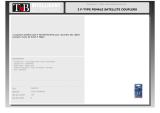
WMS190
4
BASIC OPERATION
Power On/Off
Press any button on the front panel to turn the unit on. Press the POWER button (1) to turn the
unit off. The POWER button is illuminated whenever the IGN lead (red wire) is powered,
regardless of whether the unit is on or off.
Volume Control
To increase the volume, press the VOL + button (2a). To decrease the volume, press the VOL
- button (2b).
Mute
Press the MUTE button (17) on the control panel to mute the audio output. Press MUTE again
to restore the audio output to the previous level.
Mode
Press the MODE button (4) on the control panel to select a different mode of operation, as
indicated on the display panel. Available modes include Tuner, SIRIUS and AUX In (optional
Auxiliary Input).
NOTE: SIRIUS mode will be skipped if the module is not installed.
Reset
The reset button (18) should be activated for the following reasons:
• initial installation of the unit when all wiring is completed
• function buttons do not operate
• error symbol on the display
Use a ball point pin or thin metal object to press the RESET button (18). This may be
necessary should the unit display an error code.
You can recover factory default settings using the RESUME function located on the system
menu. With “YES” flashing, press the MODE button (4) to activate.
Audio Menu
Press the AUDIO button (3) on the control panel to access the audio menu. You can navigate
through the audio menu items by pressing the AUDIO button repeatedly. Once the desired
menu item appears on the display, adjust that option by pressing the VOL +/- buttons (2) within
5 seconds. The unit will automatically exit the audio menu after five seconds of inactivity. The
following menu items can be adjusted.
Bass Level
Use the VOL buttons to adjust the Bass level range from “-6” to “+6”.
Treble Level
Use the VOL buttons to adjust the Treble level range from “-6” to “+6”.
Balance
Use the VOL buttons to adjust the Balance between the left and right speakers from “L12” (full
left) to “R12” (full right).
Fader
Use the VOL buttons to adjust the Fader between the rear and front speakers from “R12” (full
rear) to “F12” (full front).
System Menu
1. Press and hold the AUDIO button (3) for more than 3 seconds to enter the system menu.
“MENU” will appear on the display, followed by the first menu item, “CONTRAST.”
2. Press the TUNE/TRK >>| or |<< button (21, 20) or press the AUDIO button repeatedly to
navigate the system menu and select the desired item.
3. Press the VOL +/- buttons (2) to adjust the selected menu item.
4. Press the AS/PS button to return to the previous operation immediately or wait for 5
seconds to return automatically.
The following items can be adjusted:
• CONTRAST (0 – 10): Set LCD contrast.
• LOW BATT (ON/OFF): Monitor voltage on ACC line.
• DISTANT/LOCAL: Select LOCAL for tuner to access local stations whose signals are
much stronger. Select DISTANT to receive all broadcasts in your area.
• AREA (USA/LATIN/EUROPE): Set frequency spacing for various regions.
• VOL PGM (0 – 46): Select an automatic turn-on volume.
• BEEP TONE (ON/OFF): Turn the audible beep ON/OFF (heard when functions/buttons
are selected). NOTE: Beep tone off will not affect LOW BATT audible tone.
• RESUME: Return the EEPROM to factory default set up values and reset the Sirius Tuner
Settings. "Yes" will blink on the LCD to confirm. Press MODE to select.
LOW BATTERY Operation
If LOW BATT is set to “ON”, a alarm will sound (8 beeps every 30 sec) when the voltage drops
to 10.8V (+/- 0.03V). A visual warning (LOBA) will appear flashing (8 flashes every 30 sec) in
the lower left corner of the LCD display.
NOTE: “OFF” is the default setting for LOW BATT. If the audio is muted or the volume is
set to 0, the audible beep will not be heard.
3
2a
4
11
12
13
14
15
16
17
18
19
1
20
21
2b
WMS190 40W x 4
5
6 7
8
9 10













